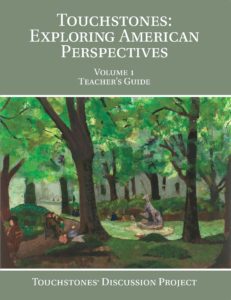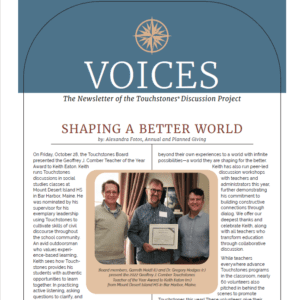
A Shady Nook, by Loïs Mailou Jones, graces the volume cover.
A Uniquely Touchstones Publication
By Touchstones Roving Reporter
Exploring American Perspectives is a Touchstones volume first published in 2012. It is a four-unit volume focused on developing critical thinkers and collaborative leaders. Where it differs from typical Touchstones volumes is in its text selection; most Touchstones volumes feature works from widely diverse cultures and traditions. Aside from its orientation lesson, the remainder of this volume is comprised solely of works by African American and Black contributors from the Colonial era through the 1960’s US Civil Rights Movement.
To clarify what Touchstones aims to achieve with this particular volume, I sat down virtually with one of the volume’s pedagogical authors, Howard Zeiderman. “This volume is important in two main ways,” he said. “One, the chronological path of the works by African American authors in some ways mirrors what participants themselves strive to do in a Touchstones program: find their voices and shed hierarchical power structures that block collaboration and inclusion. And, while the goal was never to solve race relations, we did want to help people in homogeneous or isolated communities experience how perspectives from underrepresented individuals and groups can meaningfully reshape their own thinking and understanding.”
As part of Touchstones’ civic goals, and in an effort to increase awareness of this volume, Zeiderman organized a group of twelve educators and others invested in inclusion and reconciliation—to work through the first two units of the volume together. To get a sense of what it’s like to be in the group, I spoke with some members about their experience. In general, they focused on the respectful attitude of the group and the power of the Touchstones method.
One participant noted how beginning and ending each discussion with something outside the potentially heated topic—reviewing the ground rules at the beginning and ending with evaluation—facilitated meaningful and dynamic changes in the group. Another participant presciently echoed Zeiderman’s sentiment, noting that the text selection, lesson structure, and the way the group is developing feel organically and intentionally interconnected. An example of this was cited in a lesson on a letter narrated by a former slave and written by his former master. In that discussion, the group began questioning what it means to hear an unimpeded voice or if such a task is possible—not as a historical issue but as a current issue present in the group.
The success of this group is inspiring to its members and yours truly, and it’s already led to new implementations of the volume. Additionally, schools already using this volume consistently report back impressive outcomes. The consideration of perspectives that are not otherwise equally represented in society is foundational to the Touchstones model. And Exploring American Perspectives uniquely highlights some of the benefits that arise when individuals—formerly strangers— form a new community in their exploration of voice, belonging, and necessary diversity.



 Join the
Join the